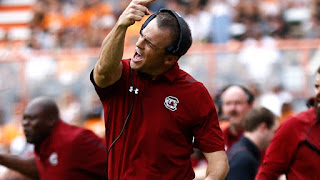Ghost Sounds: The Search for USC String Majors
Just where in the world are they?
“We are practicing or working on theory,” Hunter Harris, a sophomore viola player, said. Harris, 20, is a music education major from
USC string players are a hard breed of Gamecocks to track down, and it is because they have one of the most, if not the most, demanding course loads in the University.
“Music majors have to complete the most credit hours, next to Pre-Med,” second year violinist Haley Dreis said. “We're not necessarily loaded with heavy textbook courses, but we pursue a lot of our time and energy differently.”
Dreis, 19, of
“I've discovered many links between music and journalism, including writing in the arts entertainment section for the Daily Gamecock. Knowing this has helped me arrange my schedule to enhance my specific career goals,” she said.
Dreis also praised her “collegiate environment” in high school in helping prepare her for the load she would take on in college.
Harris said that he has “never experience a semester with less than 18 credit hours.”
“I’ve heard 18 hours are nice. I usually take about 20-23 credit hours a semester.”
Both Dreis and Harris noted the time outside of class in practice rooms as the major keeper of their time. Dreis is currently in three, as is Harris.
“Currently I'm in a string quartet, an orchestra, and a small chamber group that is voluntarily meeting to assist a junior violinist in her recital,” said Harris.
“The thing about ensembles is that they take up a ton of time with rehearsing, and most only offer 1 credit hour. It would be nice if we had less rehearsal time, more practice time, and were offered more credit hours,” Dreis said. She has been involved in USC Symphony, USC Chamber Symphony, and a string quartet since she arrived at USC.
“It's easy to get sucked into lots of ensembles and participate in every organization, but you learn how to manage your time wisely,” said Dreis.
For Brad Abromatis, 21, from
Now solely a history major, Abromatis was once a double major. “I was double majoring in music and history, but I stopped majoring in music because I needed to graduate on time, because I would have been here an extra year.”
Abromatis is not fully out of strings though. He can still be seen playing viola in a string quartet. “Strings have a connection with me because my grandmother played violin and I love classical music.”
“I do not miss double majoring because I feel like I have time to excel in the major I chose: history. I'm still taking viola lessons and playing in a string quartet, so I'm still getting my music fix,” he said.
According to Dreis, the semester can be going smoothly, and you have time for other avenues, then it close to the end, and it “gets hectic.”
“Things get hectic because everyone is performing, preparing for 'juries', and final exams.” A jury is like an audition where students play for faculty members of their respective instruments, Dreis explained.
Harris added how he feels general education courses “get in the way.”
“They (gen.-eds.) can get in the way of my ‘musical education.’ I'd rather be practicing than memorizing CSS code for a computer science class.”
Dries has advice for those thinking about being majors in music here at USC, or at other music institutions.
“Being a music major isn't for everyone. But if you're passionate about music, love practicing, performing, and/or teaching, you'll get the most out of a music degree from USC,” she said.
Harris said while although it is an arduous road, it is worth it in the end.
“We have the best professors in the Southeast at a low cost. Most of our professors went to conservatories and studied with the best of the best.”
Abromatis said that the best advice he has for prospective music majors, whether they single or double major is to “budget their time.”
“Free time is few and far between."



Comments
Post a Comment